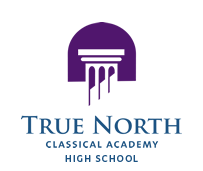Why Study Classical Languages at True North?
In an age where modern culture seems to infiltrate every facet of our existence, and the “pragmatic” as the ready reason for why we would want to do anything in life; where tradition is often pushed aside to make room for what is new and fashionable. One is begged to ask: why study classical languages and literature? What actual benefit might this have for me, now – in 2020? Why should I take classical languages (Latin and / or Greek) at True North?
Here is a quick answer. Greek and Latin languages and literature are fundamental to Western Civilization. Latin forms the basis of the Romance languages (French, Spanish, Italian, and others). Knowledge of either ancient language, with their detailed and logical grammars, makes learning any other language easier. A good deal of English vocabulary derives from Greek and Latin, especially in science (e.g. “physics”), medicine (“dialysis”), technology (“telephone”), and law (“justice,” “habeas corpus”).
The literature of the Greeks and Romans is the starting point of Western thought. It is hard to imagine what our culture would be like without the philosophy of Plato and St. Augustine, the dramas of Sophocles and Seneca, the epics of Homer and Vergil, the courtroom arguments of Demosthenes and Cicero, the mathematical discoveries of Euclid and Archimedes, or the medical investigations of Hippocrates and Galen. Modern authors from Dante and Milton to Eliot and Walcott have regularly turned to the classical texts as building blocks for their own new houses. The modern world prizes critical acumen, clarity, and precision in speech and writing. These were the qualities of language and thought most extolled by the Greeks and Romans.
Here are some quick facts:
- 60% of English words are derived from Latin and 90% of English words consisting of more than two syllables come from Latin.
- Most medical and scientific words come from Greek.
- Students of Latin and / or Greek earn higher college GPA’s.
- Assists in the development of excellent grammatical, writing and reading skills.
- Assists in the development of the brain and its discipline, structure and abstraction.
- Assists in the acquisition of the many Romance languages which have come from it.
- Improves the knowledge of ancient histories and cultures and allows direct access to key documents of the western world.
- Helps students stand out and impress college admissions officers.
When asked what he thinks when he sees Latin and / or Greek on a high school transcript, Michael C. Behnke, Vice President for Enrollment at University of Chicago, said, “This student is likely to be disciplined, have a strong basis for further learning, [and] be a little more creative toward intellectual pursuits than most.”
Once again, why study classical languages at True North? Studying classical languages have always been recognized as an essential part of a good education and for the formation of good human beings.






